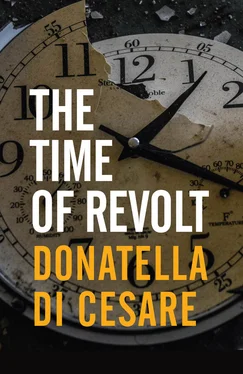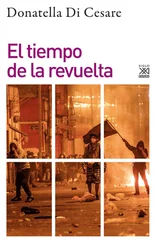Likewise, revolt is situated outside of sovereignty, in the open ground that has always been the province of anarchy. This ground should be seen not only as a space between one border and another but also as a fissure, a small opening into the internal landscape. Revolt shows the state as it is seen from the windows of the peripheral neighbourhoods, through the eyes of those who are left out or ruled out. It is obvious why, helped by the media narrative, state politics should seek to make revolt obscure and marginal. For what is at stake is not merely – or not so much – some single demand or contingent grievance.
Revolt ultimately puts the state itself into question. Whether the state is democratic or despotic, secular or religious, revolt shines a light on its violence and strips it of its sovereignty. A characteristic of the revolts of the present era – which, not by accident, first began with the slogan ‘¡Que se vayan todos, que no quede ninguno!’ – is this separation between power and people. Despite the state’s effort to legitimize itself – often by spreading alarm and flaunting its own self-confidence – this separation would now appear to be a definitive fracture. The sovereign and authoritarian reaction, itself the product of a sovereignty that has been bled dry, cannot do anything to alter this process.
In the streets and squares, political governance – an abstract administrative exercise – vaunts its inquisitorial aspect in its bid to confront a mass which it has proven unable to govern. The ungoverned burst on the scene, making their appearance in order to decry the unrepresentativeness of political institutions. This points not only to the crisis of representation, which populism so exploits, but also to a redefinition of the political space itself. The heterogeneous forms and modalities of this conflict pervade and upset the global landscape. This explains why revolt is so eminently political.
Individual demands and contingent motives are unable to offer an exhaustive explanation of this phenomenon. The killing of a demonstrator, a law that restricts democratic freedoms, an unpunished rape, a fuel price hike, a sudden increase in metro fares, the latest corruption scandal, the transformation of a park into a shopping centre, a pension reform, a religious fundamentalist reprisal – these particular causes are all necessary to any analysis of this phenomenon. Yet they are not enough to understand its full complexity. The factors behind any revolt can never be reduced to any single cause. They all originate from a combination and intertwining of different motives, which are not just economic in character but also political and existential.
Revolt expresses an unspecific malaise, demonstrates a vague but nagging unease, and reveals all the expectations that have been disappointed. The world we have before us is quite different from the development that was promised and all the boasts of progress. For this is a world that allows and fosters yawning inequalities, the logic of profit, the plundering of the future, and the spectacular arrogance of a few faced with the impotence of the many.
1 4 On the need to rethink the kinetics of revolution, see Eric Hazan and Kamo, Premières mesures révolutionnaires. Paris: La Fabrique, 2013, pp. 8ff.; Eric Hazan, La dynamique de la révolte. Paris: La fabrique, 2015, pp. 42ff.
Between Politics and Police
A revolt’s political potential is realized when it manages to highlight injustice within the surveilled confines of the public space and, in so doing, reconfigures this space itself. That is why revolt is above all a practice of irruption – arriving from the margins, it embarrasses government policy and brings its policing function out into the open. This elision is no accident. The etymological link between ‘policy’ and ‘police’ ought to be taken seriously. We can continue along the path that Jacques Rancière indicated as he looked beyond the restrictive meaning usually attributed to the term ‘police’. 5Policing is not simply a matter of truncheons, armoured cars and interrogation rooms, or even just of the state’s repressive apparatus. The so-called public order which the police manage stretches far wider than this apparatus – and, for this reason, the police’s role is decisive, even if it is not always obvious. The police discipline bodies, by allowing them to meet or by banning them from assembling, and also structure space itself, assigning roles, establishing prerogatives and competences – to have, to do, to say. They determine who can occupy what post and regulate the faculty of appearance. But, above all, they govern order – the order of the visible and the speakable, fixing the limits of participation. They include and exclude, discriminating between who does and doesn’t have a share.
Usually, a perspective internal to governance is taken for granted. Thus, beyond the administration of public order, politics vanishes and is reduced to policing alone. Indeed, this is what remains of a politics caught in the pincers of economics and crushed under a well-armoured bureaucratic machinery. This politics ends up as a mere residue, an eloquent reminder of its own tragic absence. But politics cannot be limited to the walls of the pólis alone – especially if that is taken to mean the perimeter of the state. This is especially true in the complex, unstable, fragmentary landscape of the new millennium. Whoever wears the blinkers of governance will be unable to explain the instabilities and tensions within these walls, or still less the movements that agitate the space beyond the borders, vilified as mere chaos and confusion. Everything that comes from the ‘outside’ appears as a spectre: it is both an illusory shadow and an imminent threat. Just as migration is turned into a matter of clandestine intrigues, revolt is cast as dark, apolitical disorder. A normative, governmental approach cannot do otherwise.
Only a politics that takes the opposite approach – one which moves from the edges, breaks down the barriers, and refuses any policing function – can redeem the name of politics. Such a politics is present wherever conflicts explode, wherever struggles break out. It makes injustice a shared problem for all; it puts dissent on display, sheds light on the invisible and the vilified, defends those with nothing to defend, contradicts the present divisions and shows the contingency of order. It breaks the policing hierarchy of arché , which claims a monopoly on principle and purports to have established its own command. There is no politics, if not in the anarchic interruption, in the breach where, as soon as the call for equality can make itself audible, it contradicts the governmental logic. This breach is the space where the being-together of the community is constantly rebuilt anew.
1 5 See Jacques Rancière, ‘Wrong: Politics and Police’, in Disagreement: Politics and Philosophy. Minneapolis: University of Minnesota Press, 2008.
Occupations: From the Factories to the Squares
Although spontaneous movements come and go, the forms of protest that have studded the global landscape in recent decades do display novel and peculiar characteristics.
Place de la République, Taksim Square, Liberty Plaza, Puerta del Sol – there have been countless occupations in public squares across continents. People take to the streets, coming together in some nerve-centre of the city which has been chosen for their assembly. It is as if their main concern was to avoid dispersal, to gather in a common space and at a common time despite their diverse provenance. The squares which they occupy are, in general, devoted to the circulation of traffic or simply to pedestrians or those at a loose end. The demonstrators stop there for hours, days, nights: they leave and come back again. It is almost as if they represent an alternative community.
Читать дальше












